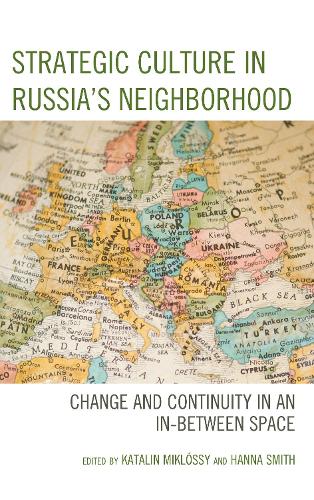
Strategic Culture in Russias Neighborhood: Change and Continuity in an In-Between Space
(Hardback)
Publishing Details
Strategic Culture in Russias Neighborhood: Change and Continuity in an In-Between Space
By (Author) Katalin Miklssy
Edited by Hanna Smith
Contributions by Jeremy C. A. Smith
Contributions by Tomas Jermalavicius
Contributions by Justyna Pierzynska
Contributions by Silviu Miloiu
Contributions by Dragomir Stoyanov
Contributions by Toni Alaranta
Contributions by Milan Subotic
Contributions by Milan Igrutinovic
Bloomsbury Publishing PLC
Lexington Books
24th July 2019
United States
Classifications
Professional and Scholarly
Non Fiction
Political economy
Warfare and defence
327.47
Physical Properties
Hardback
302
Width 161mm, Height 226mm, Spine 28mm
640g
Description
This book explains the complex relations and entanglements of Russia and its neighboring countries, an area that changed dramatically after the collapse of communism and the end of the Cold War. The chapters discuss how the strategic cultures of different countries display common characteristics rooted in this special geopolitical space that has been subjected to simultaneous changes over a longer time. Shared historical experiences provide a common ground to interpret outside threats. The spatial context is relevant in this volume because the focus is on a geopolitical in-between-ness. The position in between two ideologically, politically or economically divergent entities affects the states security considerations, maneuvering space and policy perspectives. By cross-examining competing Russian and Western influences Miklossy and Smith create a persuasive context of regional political choices.
Reviews
This volume is a welcome addition to the scholarly literature on Russia and its neighboring regions. A group of younger and more experienced experts all of whom are intimately familiar with their subject matter - offer fresh insights into regional countries historical experiences and political cultures three decades after the end of the Cold War, contributing to conceptual and empirical debates on history, identity and politics and enriching the field of intellectual inquiry. It will be of interest to academics and students alike working in regional politics and area studies. -- Derek Averre, University of Birmingham
Strategic culture, its evolution and application, is an unjustly neglected field of inquiry in international security policy. This book fills a notable gap in our understanding of the countries of central and eastern Europe, both in terms of difficulties and achievements. The editors and contributors deserve a favorable reception from academics and practitioners alike. -- Edward Lucas, senior vice-president at the Center for European Policy Analysis
Kudos to the editors and authors for an ambitious and valuable book! Contributors to Strategic Culture in Russias Neighborhood weave cultural and historical perspectives into a multifaceted look at the foreign and security policies of Russia and its neighbors. The result will be a tremendous resource for those who seek to know not only what, but also why, for years to come. -- Olga Oliker, International Crisis Group
A fascinating study of two types of `in-between-ness which looks both at how countries beyond the reach of NATO, like Ukraine or even Sweden, orient their foreign and defense policies, and at how new NATO members from Estonia to Bulgaria still combine their own strategic cultures with the NATO `standard. -- Andrew Wilson, Professor of Ukrainian Studies at University College of London
Russias innovatively aggressive behavior poses multiple hard challenges to its many neighbors and this thoughtful and insightful book examines their deepening worries and strengthening resolve to deliver proper responses. -- Pavel K. Baev, Peace Research Institute - Oslo
Countries who experienced Soviet domination or are neighbors of Russia have a specific strategic culture and approach to national security. Though they have many common features, significant differences exist, deriving from history, geography, economic dependence, and political development. This theoretically-informed volume highlights the special characteristics of in-between-ness shared among the European neighbors of Russia and provides bountiful insights into the interdependencies of this broad and complex region between East and West. -- Andres Kasekamp, University of Toronto
Author Bio
Katalin Miklssy is head of discipline of Eastern European studies at the University of Helsinki. Hanna Smith is director of strategic planning and responses at the European Centre of Excellence for Countering Hybrid Threats.
